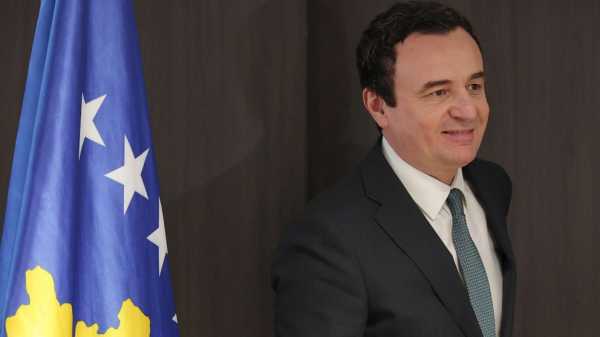
PRISTINA, Kosovo — Kosovar Prime Minister Albin Kurti has called on Western powers not to pressure his tiny Balkan country into accepting a contentious association of five Serb-majority municipalities that is ramping up tensions between Kosovo and Serbia.
Kurti told The Associated Press that the focus instead should be on making Serbia more democratic and getting rid of what he called Belgrade’s hopes of regional leadership.
Kurti said in the interview on Sunday that the Serbian government should acknowledge Kosovo’s independence in order to “face the past.” He also stressed that Belgrade should lean more toward the European Union and NATO than to Russia.
The prime minister said that if Belgrade abandons the idea that Kosovo still belongs to Serbia, “they will be much more democratic, European.”
The dispute between Serbia and its former province of Kosovo has remained a source of instability in the Balkans long after the 1998-99 war, which ended with a NATO intervention that forced Serbia to pull out of the territory.
Kosovo in 2008 declared independence from Serbia, which Belgrade has refused to recognize, supported by Russia and China. The U.S. and most EU nations have recognized Kosovo.
In recent weeks, U.S. and EU envoys have visited Pristina and Belgrade to encourage them to accept a new proposal to normalize relations and boost their EU accession bids.
A EU-mediated Kosovo-Serbia dialogue has been ongoing since 2011, but few of the 33 signed agreements have been implemented.
Kurti said of the negotiations so far that “every solution became ever more complicated, ever less implementable, and the public lost interest.” He considered the new proposal “a good framework and platform for moving forward … which makes us hopeful about the prospects of future talks and an agreement.”
The proposal’s details haven’t yet been made public.
U.S. Ambassador to Pristina Jeffrey M. Hovenier told the Associated Press that the proposal “is an interim step, that … would regularize relations in very meaningful ways and be of enormous benefit both to Kosovo and Serbia.”
“It is in both countries’ interests to get themselves into a different place in their relationship with one another,” he said.
The United States has increased pressure on Pristina to implement a 2013 agreement to establish the Association of Serb-Majority Municipalities in ethnic-Serb dominated northern Kosovo, which would coordinate work on education, health care, land planning and economic development at the local level. In 2015, Kosovo’s Constitutional Court declared part of the plan unconstitutional as it wasn’t inclusive of other ethnicities and could entail the use of executive powers.
Kurti says the establishment of the association isn’t his priority, and last week he set conditions saying it can only be formed as part of an overall agreement on the normalization of relations, which Serbia has rejected in the past. Kosovo authorities fear it would eventually undermine the country’s statehood with the help of Belgrade.
Western powers should learn from the example of Bosnia’s Serb-run ministate Republica Srpska, fearing the creation of a ministate in Kosovo, he said, adding that Belgrade used the creation of the association “as a weapon against our independence.”
“If we introduce in the Western Balkans the idea of ethnically based association of municipalities, that’s a recipe for new conflicts,” Kurti said.
Western powers should not impose pressure on smaller countries like Kosovo, he said. The problems between Kosovo and Serbia might be small and annoying, but the West should pay attention to what has been going on in the region because “any kind of wrong solution in the Balkans can and will be used elsewhere.”
The situation remains tense in northern Kosovo after Western powers helped resolve a tense situation in December when Serbs erected barricades on main roads to protest the arrest of a former Serb police officer.
Lars-Gunnar Wigemark, head of the EU’s rule of law mission in Kosovo, called the incident a “very tense standoff with barricades” and “the most serious crisis facing Kosovo … for the past decade.”
Another senior Western diplomat, speaking on condition of anonymity because of the sensitivity of the issue, said that mediators are “working very hard” to avoid anything that could provoke demonstrations or violence.
___
Follow Llazar Semini at https://twitter.com/lsemini
Sourse: abcnews.go.com